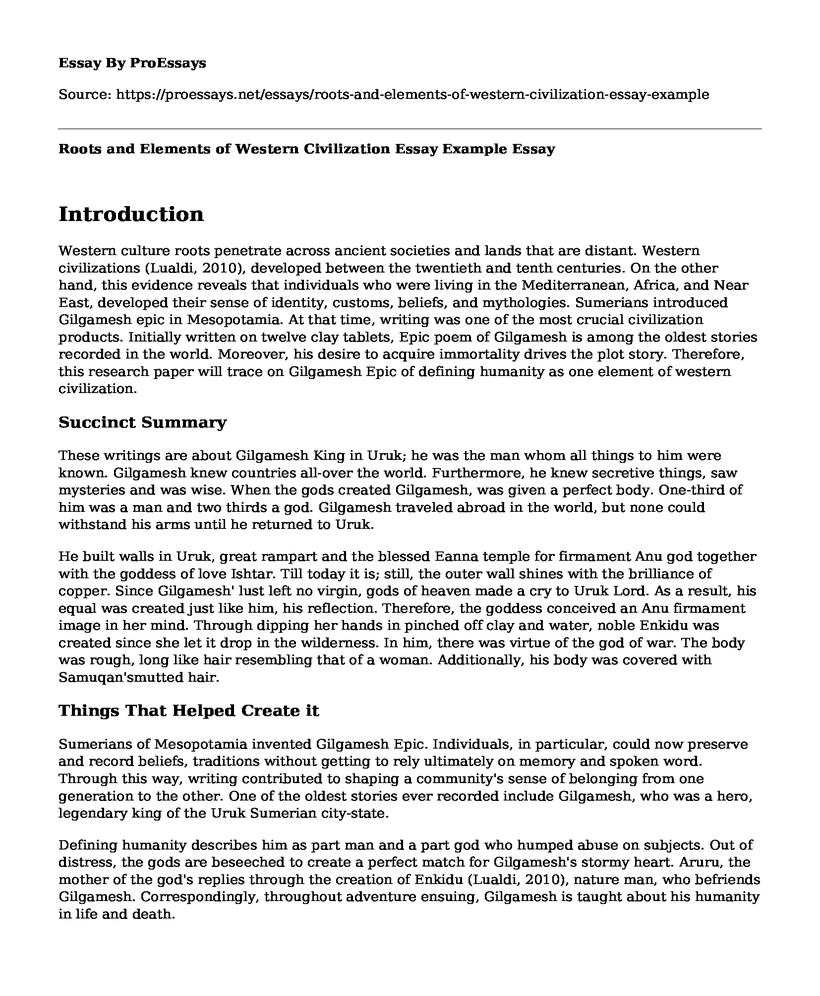Introduction
Western culture roots penetrate across ancient societies and lands that are distant. Western civilizations (Lualdi, 2010), developed between the twentieth and tenth centuries. On the other hand, this evidence reveals that individuals who were living in the Mediterranean, Africa, and Near East, developed their sense of identity, customs, beliefs, and mythologies. Sumerians introduced Gilgamesh epic in Mesopotamia. At that time, writing was one of the most crucial civilization products. Initially written on twelve clay tablets, Epic poem of Gilgamesh is among the oldest stories recorded in the world. Moreover, his desire to acquire immortality drives the plot story. Therefore, this research paper will trace on Gilgamesh Epic of defining humanity as one element of western civilization.
Succinct Summary
These writings are about Gilgamesh King in Uruk; he was the man whom all things to him were known. Gilgamesh knew countries all-over the world. Furthermore, he knew secretive things, saw mysteries and was wise. When the gods created Gilgamesh, was given a perfect body. One-third of him was a man and two thirds a god. Gilgamesh traveled abroad in the world, but none could withstand his arms until he returned to Uruk.
He built walls in Uruk, great rampart and the blessed Eanna temple for firmament Anu god together with the goddess of love Ishtar. Till today it is; still, the outer wall shines with the brilliance of copper. Since Gilgamesh' lust left no virgin, gods of heaven made a cry to Uruk Lord. As a result, his equal was created just like him, his reflection. Therefore, the goddess conceived an Anu firmament image in her mind. Through dipping her hands in pinched off clay and water, noble Enkidu was created since she let it drop in the wilderness. In him, there was virtue of the god of war. The body was rough, long like hair resembling that of a woman. Additionally, his body was covered with Samuqan'smutted hair.
Things That Helped Create it
Sumerians of Mesopotamia invented Gilgamesh Epic. Individuals, in particular, could now preserve and record beliefs, traditions without getting to rely ultimately on memory and spoken word. Through this way, writing contributed to shaping a community's sense of belonging from one generation to the other. One of the oldest stories ever recorded include Gilgamesh, who was a hero, legendary king of the Uruk Sumerian city-state.
Defining humanity describes him as part man and a part god who humped abuse on subjects. Out of distress, the gods are beseeched to create a perfect match for Gilgamesh's stormy heart. Aruru, the mother of the god's replies through the creation of Enkidu (Lualdi, 2010), nature man, who befriends Gilgamesh. Correspondingly, throughout adventure ensuing, Gilgamesh is taught about his humanity in life and death.
Influence on Aftermath Elements
Epic of Gilgamesh portrayed how humanity was restored; initially, men were perceived to be more powerful; the reason being women were not able to have power over body desire and love. Similarly, women were not capable of making decisions that were majorly based on emotions. Unless women helped Gilgamesh, then they could not be seen on a positive light. In the Mesopotamia society, women were not allowed to take part in decision-making forums, but after this epic, they were perceived as human creations too.
According to Greek and Roman myths, epic and Mesopotamia religion are personified. The gods have established relationships were by they select their preferred mortals to give directions and guidance while some other times they choose mortals that are least favored to destroy them.
Furthermore, from the Gilgamesh epic, religion and culture in Mesopotamia are viewed as shining through. Sex and religion have significant roles to play, and these roles are considered to be more critical to the coming generation of cultures and also empires. Masculine identity is crucial in (Lualdi, 2010), culture by merely analyzing the broad description of Gilgamesh and Enkidu. A leader and a king are viewed as one who is respectable, brave and strong.
Continuing Influence If Any Today
Mesopotamia excavations changed the history of the world, in such a way that civilizations flourished over thousand years till today they continue influencing individuals. As a result (Lualdi, 2010), they create innovations, technologies, belief structures and genres which further spread to peoples of later century. Gilgamesh Epic aids in creating humanity in world-wide Kings instead of them just subjecting their servants to hardships.
Conclusion
Gilgamesh epic helps us learn the practices of early Mesopotamian society and the advancement of early literally forms. Despite the majority of early works that were written being overwhelmingly commercial or practical in form, surviving texts give us insights that are unique about the culture of Mesopotamia. Significantly, the role of the advisers was to make sure they encouraged their king to behave and act in a morally right fashion. In return, his physical powers were admired by many during that time, and till today it continues to create a narrative worth to tell to all civilized continents.
References
Lualdi, K. J. (2010). Sources of The Making of the West. Peoples and Cultures.A Concise History, 1, 2a.Retrieved on 15th March 2019 from https://ereader.chegg.com/#/books/9781457605505/cfi/0!/4/[email protected]:0.00
Cite this page
Roots and Elements of Western Civilization Essay Example. (2022, Dec 10). Retrieved from https://proessays.net/essays/roots-and-elements-of-western-civilization-essay-example
If you are the original author of this essay and no longer wish to have it published on the ProEssays website, please click below to request its removal:
- Contrast of Two Theoretical Perspectives on Human Development
- Free Thought Ideology an Types of Activism Essay
- Management Administration: Event Planning Manager Paper Example
- Comparing Baghdad to the Last Great Native Civilization in Central Mexico (The Aztec)
- Descriptive Essay of My Mother
- Essay on China's Non-Verbal Communication: Differences in Low-Contact Culture
- Essay Sample on Quisqueya: The Dominican Republic National Anthem and Its Cultural Significance







